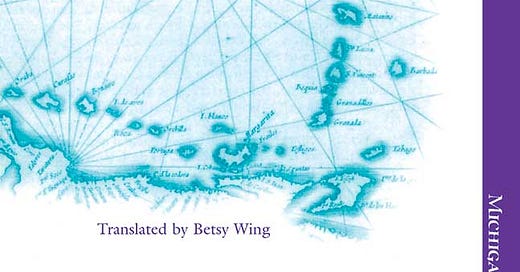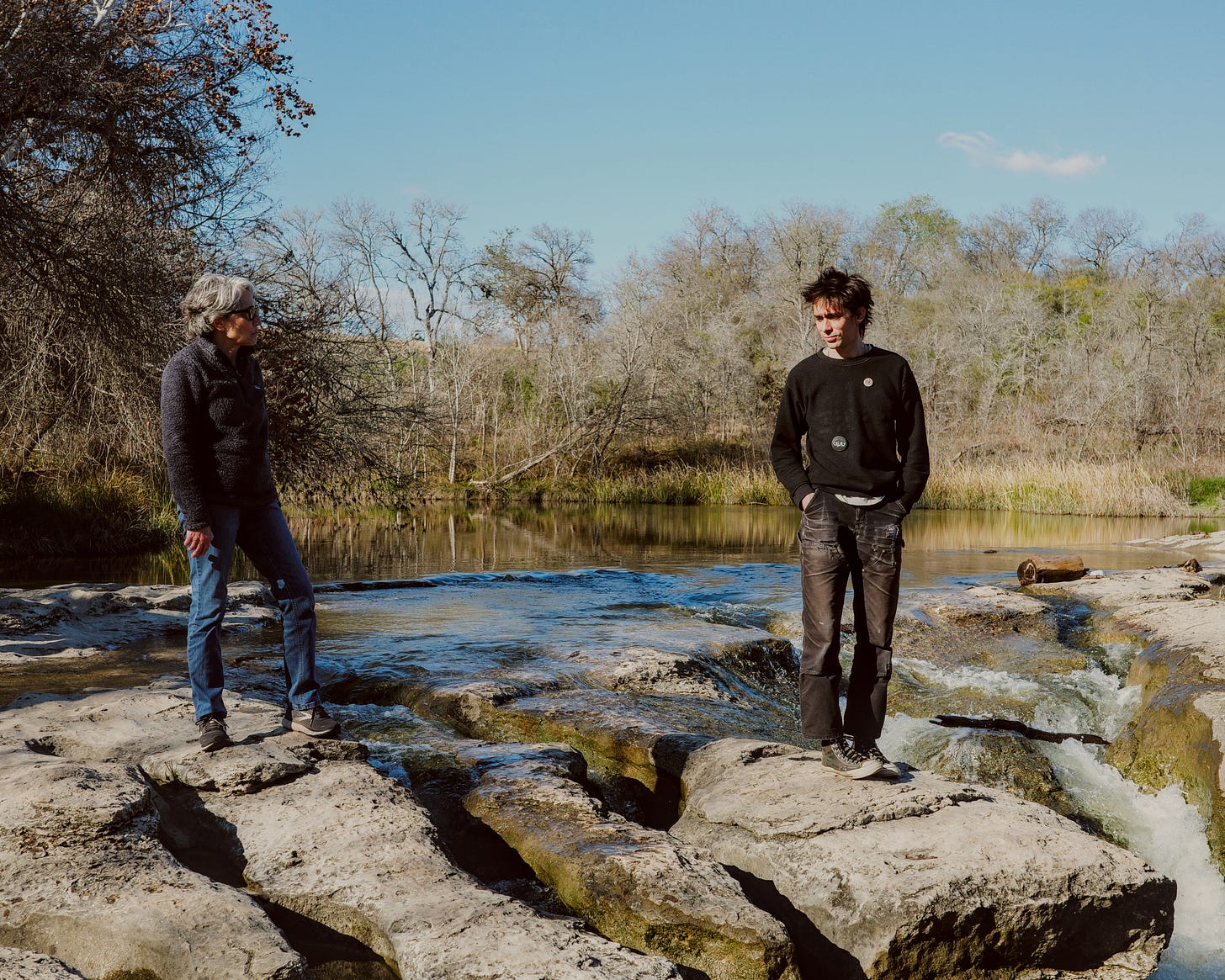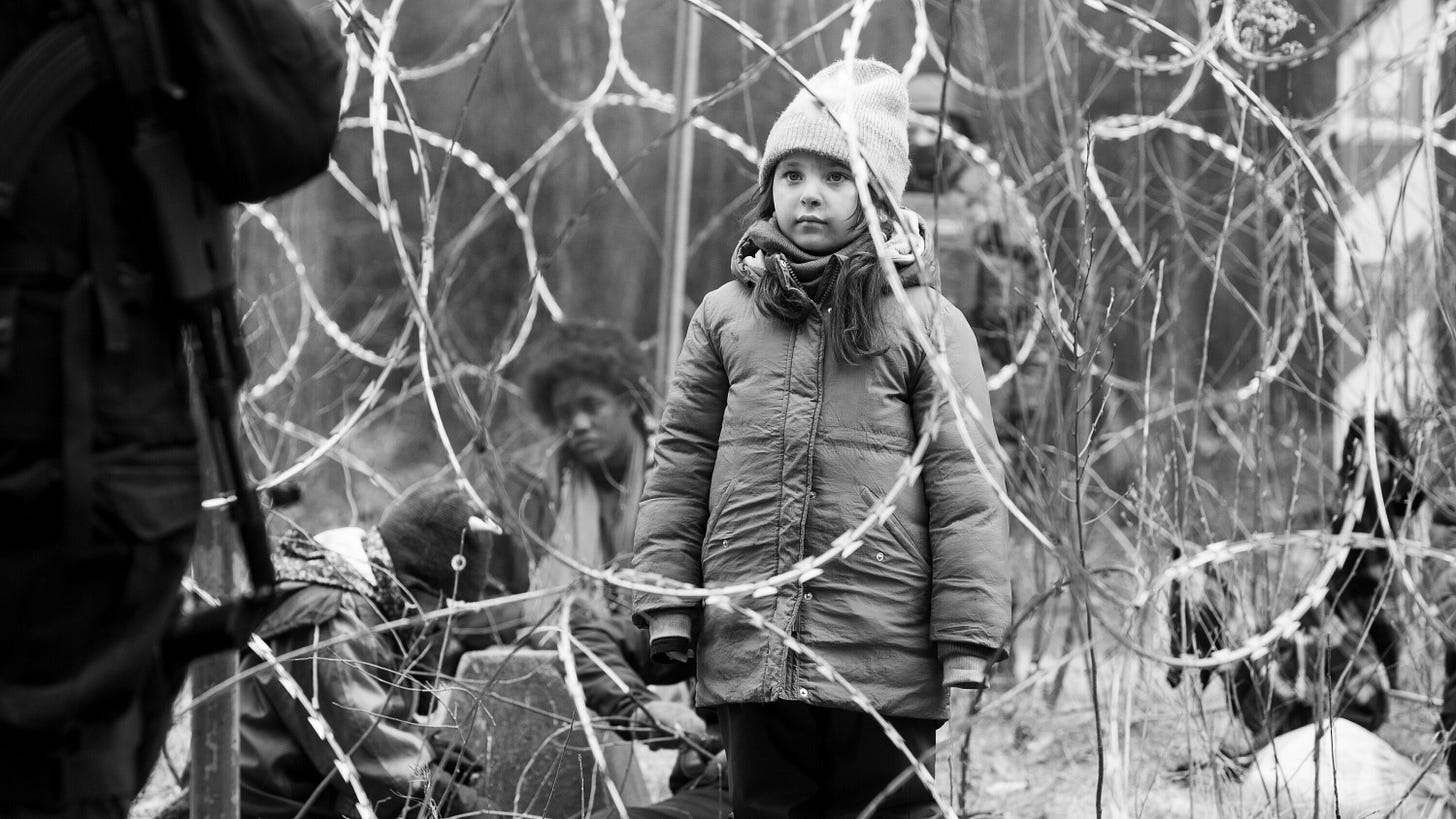#43: Edouard Glissant, Joe Kessler, lots of movies
Hello my beautiful friends. Life has been good. I work, read, exercise watch movies, see friends, meet wonderful people, etc. I’m waiting for the cold front to pass. I started group therapy recently and it’s been interesting so far and I’m excited to see in what directions it moves my personal growth and general journey of life.
Here’s a photo of Mose and his incredible mom. Happy 70th birthday to Arak’s mom.
The death count in Palestine continues increasing at what seems like an unbreakable pace and Netanyahu has stated that there will be no Palestinian statehood after the “war.” In the midst of their incredible disruption of the flow of economic goods, the Houthis of Yemen have been relisted as a terrorist organization by the United States. Germany is forcing artists who receive state funding to declare their support of Israel and seems to be making those applying for citizenship to do the same. Fuck Israel and fuck Germany and fuck the US. For good news, Yemen has declared the United States, the United Kingdom, and Israel as terrorist organizations. Terrorism as a signifier has become so entirely emptied in my head, but I love to see it thrown back at us in the West at least.
I spoke with my cousin on the phone a couple days ago and we were talking about Palestine. We tried to remember how people stand in support of Israel and what narratives are employed to convince them of their stance and what narratives they parrot. We had both momentarily forgotten the “fuck Hamas” rhetoric. I try to understand this kind of position, so loosely tied to history and find myself simply confounded. I wonder if it is idealistic of me, or perhaps tremendously naive, to think of the problem as one of relation — the inability of the westerner to affix enough humanity to a Palestinian as to create a genuine relation based on what one can and cannot understand about the other.
Poetics of Relation by Edouard Glissant
This book is a fucking monster. For so long I feared it because of its intensely academic title and my own struggles with poetry (I blame it on math brain). Poetics of relation gives and gives and gives. For one, Glissant is an unparalleled commentator on the works of Deleuze and Guattari and deftly expands their work to the Antilles. Have you ever felt that your identity is not necessarily your own but instead built on your relation with others? This is the kind of rhizomatic, semiotic relation that Glissant builds. It is against the totalitarian, profound, singular root that Glissant writes — the root of nation, state, empire.
Glissant uses the term opacity to describe that which cannot be understood, especially that which cannot be understood by the social sciences or the then kind of burgeoning field of information sciences (the book pairs well with Lyotard for that reason). Glissant’s writing is so profound that all my efforts to discuss his ideas disappoint me. More than most books, Poetics of Relation has inspired me to grow, move forward, remain fluid, to loosen up my identical roots that are planted too deep, and plant shallowly, nomadically, generously seeds of relation, especially to that which remains opaque to me. Poetics of Relation is a book to live by and with.
The Gull Yetin by Joe Kessler
The Gull Yetin is a beautiful graphic novel unmarred by the assuredness of the written word. A boy wakes up to his house on fire and is saved by a gull that takes on various identities. The gull helps, hinders, heals, and injures others. Nearly a trickster, yet perhaps only misunderstood as he acts out of joy, love, jealousy, grief, compassion, and cruelty, the eponymous gull is a truly tragic and beautiful figure.
Movies! I have seen so many recently.
Cane Toads: An Unnatural History by Mark Lewis documents the import of the gigantic Cane Toad into Australia as an effort to squash the Cane Grub that was destroying the sugar cane crop. A counter-pest. Mark himself doesn’t say too much, but he talks to some incredible Australian freaks who love or hate the toad, films often from the point of the view of the Cane Toad themselves to a pretty hilarious effect, and documents their incredible spread across the land. What he doesn’t say, but allows the viewer to understand if they choose, is the way that Australia is colonized with horrible European ideas (like bringing one species in to help heal another non-native species (sugar)), and that the human-animal distinction is so much more complex and interwoven than many would believe. That Dark Emu book, which is kind of like the Braiding Sweetgrass of Australia in its subject matter, beauty, and popularity, would be a great book to read before or after a viewing of Lewis’ masterpiece.
Mark Lewis also made a movie called Rat about rats in New York City. Again, an eccentric blend of freaky, funny people, this time New Yorkers, talk about their relationship with the pest that is such a large part of their life, like it or not. The divide human life and animal life is only about a half-inch thick and more porous than you think.
Green Border weaves a brutal narrative of immigration and activism at the Polish and Belarusian border. Agnieszka Holland does not shy away from or hide the brutality that vulnerable people in these liminal spaces encounter. Go look at user-submitted reviews of this movie somewhere, you’ll see that half of them are one-star reviews from angry, defensive Poles that rush to ask why Holland doesn’t let all the immigrants live in her house and remind the reader that Poland let all the Ukrainians in (which of course is Holland’s point).
Seven Samurai is indeed one of the greats. Cameras were made for this. There’s certainly nothing new I can say about it. I tried to watch it once two years ago a few days after Christmas in between devastating bouts of puking from, I think, a weird grape from the Whole Foods salad bar, but I was too tired and kept falling asleep from the physical exhaustion that food poisoning brings. This time, I went in tired and felt wired as soon as the movie started. It may be set in the 16th century, but Seven Samurai is a pinnacle of modernism. The Ulysses of film? Helen Dewitt wrote a novel called, unfortunately, The Last Samurai that has nothing to do with Tom Cruise and everything to do with Kurosawa, language acquisition, mathematics, ethics, and human potential. It’s one of my favorites (even before having seen this movie), check it out if you’re in need of a book.
I’ll keep this short - I also saw the climate gentrification documentary Razing Liberty Square that would pair well with The Pruitt-Igoe Myth, another documentary called Advocate that follows Israeli lawyer Lea Tsemel and her unflinching protection of Palestinians who commit acts of violence against Israelis (incredible), and another 80’s Godard, First Name: Carmen, that I still need more time thinking about (that’s Godard’s gift I think).
Next time, some Alaa Abd El-Fattah and who knows what else. Maybe some more Sigrid Undsett, Derrida, Gayl Jones. Maybe Aldi Ophir’s gigantic book on ethics or the recent Emily Wilson translation of The Iliad. What are you reading and watching and listening to? What are you learning about, thinking about, doing about?










